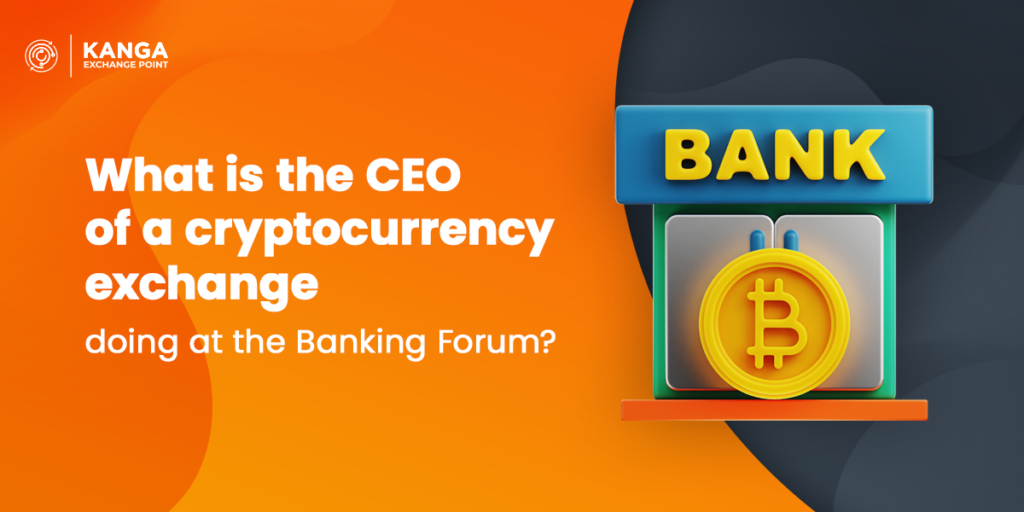What is the CEO of a cryptocurrency exchange doing at the Banking Forum?

Kanga Exchange is trying to reach the widest possible audience – both people with a keen interest in cryptocurrencies and those still not fully convinced by digital currencies. Therefore, it is necessary for Kanga to appear wherever no one expects it. Knowing the current – unclear – situation of cryptocurrencies in Poland, it is difficult to find a more surprising place than the Banking Forum – a congress bringing together representatives of the domestic banking sector!
What is the Banking Forum?
The Banking Forum is a cyclical event that brings together both representatives of the banking sector and those who work closely with it, or companies that provide financial products. This endeavor operates under the aegis of the Meeting of Leaders Banking and Insurance 2022 together with the Insurance Forum conference intended for insurers and stakeholders in financial industry activities.
The event, the 24th Banking Forum & 20th Insurance Forum, took place from October 25 to 26 at The Westin Warsaw Hotel in Warsaw, and was attended by a total of nearly half a thousand participants.
Cryptocurrencies at the Banking Forum – how did it happen?
Slawek Zawadzki, co-founder and CEO of cryptocurrency exchange Kanga Exchange, assumes that it is not enough with his idea to convince the already convinced – people interested in digital currencies. The key is to convince the unconvinced – people who downplay the impact of blockchain technology on the modern financial world picture or are unaware of its many advantages. This is mainly about conservative supporters of fiat currencies and electronic money – it’s hard to find a more acute place to gather them all than the Banking Forum just now.
Therefore, the CEO of Kanga Exchange decided to go to the proverbial lion’s den with his lecture entitled. “Love in times of pestilence, why will banks love crypto?“. The purpose of the speech was to explain to the Polish elite of the banking world why cryptocurrencies are a necessary technology for the world of modern finance. As Slawek explained, the title is meant to inspire the recipients of the message to think a bit.
The lecture was preceded by the playing of a video clip prepared as part of the social campaign “And you who will you be when the bubble bursts?” by the Financial Supervisory Commission (KNF). This one referred to cryptocurrencies in general in a pejorative way, as there was a reference to “the bubble of illusionary investments” or “cryptocurrency” (a firm favorite of the author of this text). Moreover, according to this narrative, cryptocurrencies are in the same “financial risk group” as financial pyramids and unsupervised Forex. It is hard to believe that such a serious entity uses this kind of optics.
An effective way to address the doubts of the “other side” is to present their perspective, and thus encourage them to become more educated in the area of the topic under discussion. This premise in no way has a negative connotation, nor is it intended to highlight the ignorance, for lack of a better word, of the opponent. The cryptocurrency community repeats like a mantra that investing in digital currencies must be preceded by adequate knowledge. Those who are unable to understand this only risk losing their capital and their time.
Slawek Zawadzki makes just such an assumption, so in a counterpoint, for the next minutes of the lecture, he presents the history of cryptocurrencies over the years, taking the development of bitcoin as the main focus.
So what can you learn from the Kanga Exchange CEO’s speech at the Banking Forum?
Bitcoin was created, as it were, in response to the 2008 global financial crisis, the prelude to which was the collapse of the high-risk mortgage market in the United States. The crisis, by the way, also left its mark in Poland, primarily on people with franking credits. Their installments were able to double from month to month. This was due, among other things, to the collapse of one of the largest American banks, Lehman Brothers.
But, as Slawek points out, 2008 was a good year for the cryptocurrency community. This is because the crisis caused a Bitcoin manifesto published by a person (or group of people) nicknamed Satoshi Nakamoto to appear on the Internet on October 31 of that year (importantly, the date coincided with Reformation Day, when Martin Luther nailed his 95 theses on the door of All Saints’ Church in Wittenberg). It was thanks to this gesture that the currency was created, which is “free money”, immune to third-party influence. The money of the people, one would like to say.
This is only an introduction to tell the further fate of cryptocurrencies to the present day. Those eager for learning more about them are referred to Slawek Zawadzki’s speech at the 24th Banking Forum & 20th Insurance Forum, which is available on Kanga Exchange’s YouTube channel.
Thank you for reading the article! We encourage you to visit our Kantor blog regularly for the latest news from the world of cryptocurrencies!